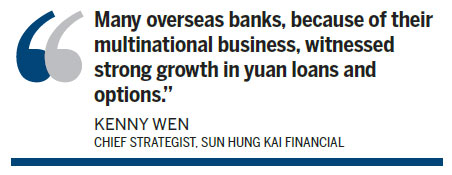Overseas banks have great H1 in China as renminbi deals surge
Updated: 2014-08-29 07:15
By Jiang Xueqing and Emma Dai(China Daily USA)
|
|||||||||
Global lenders cash in on rising businesses from domestic and foreign companies, report Jiang Xueqing in Beijing and Emma Dai in Hong Kong.
Many overseas banks reported double-digit profit growth in China in the first half of 2014 thanks to a rapid increase in corporate banking and cross-border renminbi business.
London-based Standard Chartered Plc saw its China income go up 15 percent year-on-year to $515 million and its before-tax operating profit rise 65 percent to $193 million.
HSBC Holdings Plc, also headquartered in London, announced a 64 percent year-on-year increase in profit before tax for its Chinese mainland operations.
Bank of East Asia Ltd saw its profit before tax for mainland operations grow by 25 percent to HK$1.54 billion ($199 million) as of June 30, the bank said.
And DBS Group Holdings Ltd, the former Development Bank of Singapore and Southeast Asia's largest lender, reported its net profit for the Chinese mainland and Taiwan rose to $160 million in the first half, up from $58 million in the same period of 2013. Its income in the same region posted growth of 42 percent to $503 million, as both net interest and non-interest income rose.
Kenny Wen, chief strategist for Sun Hung Kai Financial, a Hong Kong-based wealth manager, said the profit gains that overseas banks achieved on the Chinese mainland can be attributed to growth in corporate banking business as well as lower operating costs.
Cross-border renminbi business also picked up steam on the mainland after the daily trading range of the currency was widened in March to 2 percent from its previous band of 1 percent.
"Many overseas banks, because of their multinational business, witnessed strong growth in yuan loans and options," Wen said.
With progress also being made in the China (Shanghai) Pilot Free Trade Zone, along with efforts toward opening up China's capital account, Wen expects renminbi business will continue to pick up as growth in the offshore renminbi pool accelerates.
Standard Chartered saw strong corporate client activities, cross-border trades and a steady increase in renminbi business during the first six months of 2014 despite China's economic slowdown, said Jerry Zhang, CEO and executive vice-chairman of Standard Chartered Bank China.
"In particular, we had a strong performance in transaction banking, benefiting from trade volume growth, and in assets and liabilities management, benefiting from our global leadership position in the internationalization of the yuan," Zhang said.
Standard Chartered became one of the first market-makers for direct trading between the yuan and the British pound. It was also among the first batch of banks to launch cross-border renminbi loans in the Suzhou Industrial Park in Jiangsu province.
The bank teamed up with clients to conduct the first non-quota-based yuan-denominated two-way cross-border sweeping transaction in the Shanghai FTZ.
Zhang said the bank will continue to invest in China and expand its service network.
Along with providing support to small and medium-sized enterprises and high-net-worth individuals, it will help foreign companies enter and expand in China, and assist Chinese enterprises in exploring overseas markets, he said.
Bank of East Asia recorded a huge increase in fee income generated from corporate customers. Competition for deposits intensified in the first half of this year, driving up funding costs. This exerted pressure on BEA China's net interest margin, which fell by 24 basis points from the second half of 2013, the bank said in announcing its 2014 interim results.
To optimize business potential, BEA China shifted its focus from expanding its onshore loan portfolio to arranging offshore loans for clients requiring funding for overseas business expansion.
As a result, the outstanding amount of standby letters of credit issued by BEA China to secure offshore borrowings for its customers grew significantly, generating fee income.
As of June 30, the outstanding number of standby letters of credit issued by BEA China in favor of the bank's business units in Hong Kong and abroad was up by 77.9 percent from the end of 2013.
This boosted the net fee and commission income of the corporate banking business by 37.5 percent year-on-year, the bank said. China, however, remains only a small part of overseas banks' business.
John Caparusso, banking analyst of Standard Chartered Bank (HK) Ltd, said: "Foreign banks are not constrained by the industrywide slowdown in China because their operation is tiny in the country, so the comparable base is quite small. Their growth in percentage terms is rapid, but in absolute terms, it's insignificant."
He said foreign banks in aggregate claim roughly 2 percent of total bank loans in the country. Even a large foreign bank like HSBC has a China market share that is well below 1 percent. None of them accounts for more than 0.5 percent.
But China is certainly an important market for foreign banks as the country is set to become the world's biggest economy at some point.
"While the physical presence of foreign banks remains small in the country, their market potential is significant. Their China business will continue to grow rapidly. Foreign banks are serious about China. They will definitely hang on," Caparusso said.
Financial experts like Wen expect that the opportunities China offers will have foreign banks allocate more resources in the country.
"As an emerging market, China is growing faster than many others, and the internationalization of the yuan has just taken off. We are optimistic about foreign banks' China business. We predict they will launch more new products to take advantage of the momentum in the country," Wen said.
He added that China operations look outstanding for foreign banks as many other markets suffered a bleak first half. Some banking giants were fined in the United States for regulatory violations. And Standard Chartered incurred a $127 million loss in South Korea and has since sold off parts of the business.
Contact the writers at jiangxueqing@chinadaily.com.cn and emmadai@chinadailyhk.com

(China Daily USA 08/29/2014 page17)
Most Viewed
Editor's Picks

|

|

|

|

|

|
Today's Top News
US, China to parley on extradition of criminals
US rice could see potential market in China
China accuses US over 'close-in reconnaissance'
EB-5 visa ceiling is short-term, expert says
China and US in talks on code of conduct
Chicken market gets a boost
Microsoft 'not fully open with sales data'
Lawmakers in move to tackle espionage threat
US Weekly

|

|
















